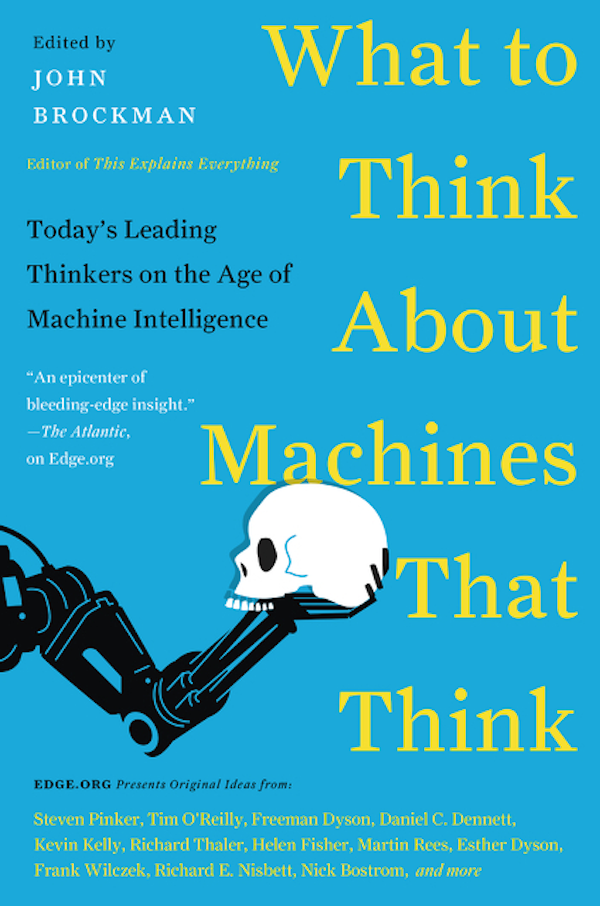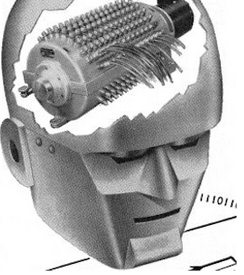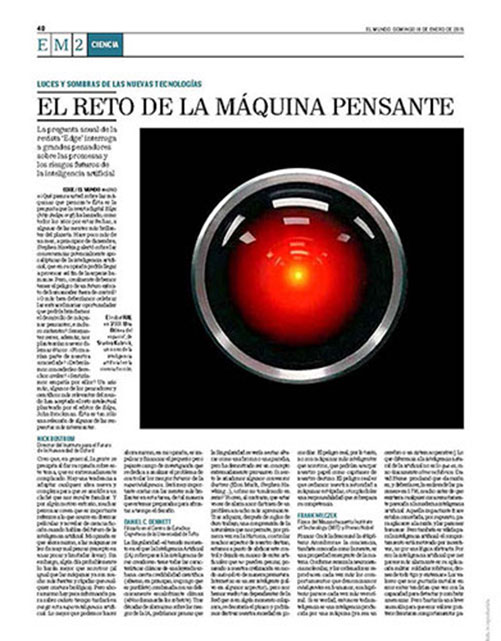On the site Edge.org discussed the dangers of artificial intelligence (AI) in November, led by Stephen Hawking and philosopher Nick Bostrom has recently warned of what superior and possibly malevolent artificial intelligences could get up to. Only two people were worth reading: Jaron Lanier , which is critical to AI, and Rodney Brooks , which is positive. ...
Edge in the News: 2015 Annual Question

John Brockman, curator of the online salon edge.org for current debates on research, has asked 175 renowned experts from, among others, AI research, psychology and brain research: "What should we think of artificial intelligence?" (S. Fischer, 2017). The short essays give a good overview of the current debate and present equally pessimistic and optimistic assessments.

Robots are not afraid that some patient will file their claim, do not have to pay student loans from medical studies, do not accumulate savings in the event of a trial. Maybe that's what they need to entrust to our health?
Everything you would like to know about artificial intelligence, but you are afraid to ask. The book What To Think About Machines That Think, the excerpts of which we present, are 186 short essays by eminent contemporary representatives of people of science, culture and social life. They make up a wide overview of artificial intelligence.
John Brockman, a New York publisher, editor, founder of the Edge.org website and think tank, has been asking the most interesting minds in the world of science and art for more than 20 years, asking for innovative, original answers.
He has brought together scientists and artists from around the world to bring readers' insights, thoughts, and predictions about artificial intelligence: In a book about brainstorming and learning computers, John Brockman summarizes the state of the discussion.
It is one of the topics about which science and now also society have been discussing, researching, and arguing for decades: Artificial Intelligence. But it begins with the concept. Is not it better to call "designed intelligence"? Because unlike intelligence in humans, an "intelligent" program of a computer has been deliberately designed and created in a certain form. This is one of the suggestions that finds itself in a book that is as stimulating as it is entertaining by John Brockman, which is now available in German: "What do we think of artificial intelligence?"

. . . AI doomsday scenarios are often predicated on a false analogy between natural intelligence and artificial intelligence. As Harvard University experimental psychologist Steven Pinker elucidated in his answer to the 2015 Edge.org Annual Question “What Do You Think about Machines That Think?”: “AI dystopias project a parochial alpha-male psychology onto the concept of intelligence. They assume that superhumanly intelligent robots would develop goals like deposing their masters or taking over the world.” It is equally possible, Pinker suggests, that “artificial intelligence will naturally develop along female lines: fully capable of solving problems, but with no desire to annihilate innocents or dominate the civilization.”

 ...[W]ith the culmination of decades of progress in building advanced computing devices and machine learning putting the world on the cusp of true AI, the ground is finally fertile for philosophers, scientists and all manner of other experts and thinkers to jump into the discussion with their own vision of the future of the thinking machine.
...[W]ith the culmination of decades of progress in building advanced computing devices and machine learning putting the world on the cusp of true AI, the ground is finally fertile for philosophers, scientists and all manner of other experts and thinkers to jump into the discussion with their own vision of the future of the thinking machine.
What to Think About Machines That Think is a compilation of incredibly short essays on AI, edited by John Brockman ... literary agent to some of the finest minds of our times. ...
Brockman currently runs the ‘online science salon’ edge.org (which The Guardian once called “the world’s smartest website”). The Edge Question, which he poses every year to his extended network of exceedingly intelligent friends and clients, is a simple, direct question that seeks to push the boundaries of understanding on a burning scientific issue.
Year 2015’s question prompts respondents to ruminate on the potential technological, ethical and even emotional issues that will arise when the first machines start to think independently. ...

Theoretical physicist Stephen Hawking is on record about the rising class of technology that can perform almost any conceivable task, from driving us to work to babysitting our children. His dour outlook, expressed to the BBC in 2014: “I think the development of full artificial intelligence could spell the end of the human race.”
Hawking says the primitive AI we’ve known to date — the kind that switches on the air-conditioning before you get home from work — is useful enough. But he fears the next stage, when intelligent, thinking machines can independently improve themselves and begin to determine their own destinies. Will that ability exceed humans’ ability to contain it? What then? Where will humans fit into an AI world? Will the robots have any use for us?
These questions are not so farfetched to the nearly 200 scientists, scholars, artists and public intellectuals who contributed essays for the recently released book What to Think About Machines That Think, edited by John Brockman. Few are as pessimistic as Hawking, but most agree humans should be busy thinking through our future coexistence with the new class of being now under construction. Will they serve us? Will we serve them? Or will we somehow merge into a single, super-being? ...

Just about everyone, no matter how tech-enamored or word-weary, appreciates receiving a book as a holiday gift. So, we decided to ask local booksellers which titles have been flying off their shelves — and see whether they had any special recommendations for hidden gems. ...
Jane Stiles at Wellesley Books added that the novels “The Japanese Lover” by Isabel Allende and “Avenue of Mysteries” by John Irving were popular gift choices this year. At Papercuts J.P., one of the area’s newest bookstores, owner Kate Layte said nonfiction has been very popular this year, including many of the titles already mentioned, along with Helen MacDonald’s memoir “H Is for Hawk.”
In addition, Layte said, “there are some great paperback originals I’ve been selling lots of like ‘An Indigenous Peoples’ History of the United States’ by Roxanne Dunbar-Ortiz, ‘The Best American Infographics 2015’ — the editor, Gareth Cook, lives here in JP — and John Brockman’s new collection of essays, ‘What to Think About Machines That Think: Today’s Leading Thinkers on the Age of Machine Intelligence.’ ” A special favorite in fiction is “Katherine Carlyle” by Rupert Thomson. “When folks see the blurbs from James Salter and Phillip Pullman, they can rest assured they’re holding a treasure,” she added. ...

Why should AI scare us? Let’s compare natural vs. artificial intelligence, using Edge’s 2015 big question: What to think about machines that think?
... Alison Gopnik feels machines aren’t nearly “as smart as 3-year-olds.” While AI sometimes outwits Garry Kasparov, it needs millions of pictures (labeled by humans) to learn to recognize cats. Infants need a handful (amazing pattern detectors, + see what babies know, butscientists often ignore). ...

When Ada Lovelace and Charles Babbage invented the world’s first computer, their “Analytical Engine” became the evolutionary progenitor of a new class of human extensions — machines that think. A generation later, Alan Turing picked up where they left off and, in laying the foundations of artificial intelligence with his Turing Test, famously posed the techno-philosophical questionof whether a computer could ever enjoy strawberries and cream or compel you to fall in love with it.
From its very outset, this new branch of human-machine evolution made it clear that any answer to these questions would invariably alter how we answer the most fundamental questions of what it means to be human.
That’s what Edge founder John Brockman explores in the 2015 edition of his annual question, inviting 192 of today’s most prominent thinkers to tussle with these core questions of artificial intelligence and its undergirding human dilemmas. ...
What to Think About Machines That Think is an immeasurably stimulating read in its entirety, exploring the intersection of science, philosophy, technology, ethics, and psychology to unravel some of the most important questions worth asking. ...

With This Idea Must Die (2015) barely off the presses, Brockman, editor of the online science salon Edge.org, asked the world's intellectuals for another opinion. They deliver in the latest of the editor's thick compendiums.
Occasionally turgid academic prose rarely mars the nearly 200 lively essays (few of which go beyond five pages) on the future of artificial intelligence. Every contributor—scholars, philosophers, artists, scientists, and journalists, including stars such as Freeman Dyson, Stephen Pinker, Brian Eno, and Daniel Dennett—knows that humans can already make a thinking machine in less than a year. Since the process obeys the laws of nature, a thinking computer is possible and, therefore, inevitable. ...
A satisfying experience for readers looking for thoughtful answers to big questions.
Edge
Translation: Veronica Puertollano
Machines can imitate perfectly some of the ways humans think all of the time, and can consistently outperform humans on certain thinking tasks all of the time, but computing machines, as usually envisioned, will not get right human thinking all of the time because they actually process information in ways opposite to humans in domains commonly associated with human creativity. ...

A response to the 2015 Edge question.
It seems increasingly likely that we will one day build machines that possess superhuman intelligence. We need only continue to produce better computers—which we will, unless we destroy ourselves or meet our end some other way. We already know that it is possible for mere matter to acquire “general intelligence”—the ability to learn new concepts and employ them in unfamiliar contexts—because the 1,200 cc of salty porridge inside our heads has managed it. There is no reason to believe that a suitably advanced digital computer couldn’t do the same. ...

We all know that computers can sometimes automate work, taking jobs away from humans. But it can augment human workers as well, making them more effective. In our ongoing research, we’ve found that so far augmentation is far more common, even in the emerging area of “cognitive computing,” in which machines can sense, comprehend, and even act on their own. In this sense, cognitive computing is more about “Person and Machine” than “Person versus Machine.”
But our view grows out of our observations of organizational applications available today. What about in the future?
For well-informed prognostication, it’s helpful to turn to the brain trust at Edge.org. Each year, Edge.org publishes essays from thinkers, scholars, and researchers on a question related to a hot topic in public and academic discourse. This year’s question was, “What do you think about machines that think?” It prompted 186 respondents to write more than 130,000 words total.
While the essays looked at a range of issues, a number of respondents touched on advances in how thinking machines could augment human intelligence. They discussed carefully-considered forms of human-machine interaction, many of which have implications to various businesses and industries including management, health, and creative fields. These answers help us to imagine what the future of computer-augmented work will look like, and what the challenges are to getting there. ...

The world continues its path as technology advances and some futurists have been making bets that seem incredible about what we will achieve in the not too distant future.
Futurist Ray Kurzweil, for example, believes that by 2040 artificial intelligence will be so good that the humans will be completely immersed in the virtual reality that, when technology becomes advanced enough to change the human race irreversibly something will happen called Singularity.
Kevin Kelly, who helped launch Wired in 1993, believes the next 20 years in the field of technology will be radical.Therefore, according to him, technological advances will make the past 20 years "pale" in comparison.
Kelly points out that if you send to the past with a time machine, even if they were only 20 years, and we counted the people we have now and what we'd have time on mobile devices: a free encyclopedia and street maps of most cities in the world, pictures of real-time scores and stock quotes, weather reports, PDF files of all books in the world, etc .; simply call us crazy.
"There is a feeling that everything important has already happened, but relatively speaking, nothing important has happened yet. In 20 years we'll look back and say that not much has happened in the last 20 years. "
How will these amazing changes? Kelly said some of his predictions in an interview with John Brockman on Edge. They are very simple and not so futuristic predictions as they are already quite predictable: robots, big monitoring data ... and something interesting, a human they would then ask intelligent questions. ...
This was quite a week. Settle into to your favorite easy chair, pour yourself some freshly brewed Sumatra coffee and enjoy these longer-form weekend reads:
- What Do You Think About Machines That Think? (Edge)

Once again, the online magazine Edge has returned to stimulate an exciting intellectual debate of great height, with the annual question that launches on these dates to some of the brightest minds of our time. On this occasion, its brilliant editor John Brockman has raised the challenge of dissecting the lights and shadows of the artificial intelligence (AI): "Do you think about the machines that think?" The responses reflect a wide range of views among some of the great scientists and thinkers of the world today, showing that there is no consensus clear when assessing to what point should celebrate or fear the emergence of thinking machines.
At one end are the great American philosopher Daniel C. Dennett, who mocks with much scorn of the "urban legend" according to which "the robots we will dominate" in the near future. On the other are scientists of the stature of the astrophysicist's NASA and Nobel prize winner John C. Mather, who is convinced that the artificial intelligence "will become a reality, and quite soon", taking into account the massive amount of money that is already being invested in this field, and the enormous potential benefits awaiting entrepreneurs who built the first computers with human (or superhuman) intelligence.
However, although experts are not based on the time of predict whether much or little time for the era of AI, there is a very broad consensus on the unstoppable advent, sooner or later, this revolution. The reason explains it very well the physicist and Nobel Prize Frank Wilczek, citing the famous "astonishing hypothesis" of the co-discoverer of DNA, Francis Crick: the human mind is nothing more than "an emergent property of matter" and therefore "all intelligence is intelligence produced by a machine" (either a brain formed by neurons or a robot manufactured with silicon chips).
As I said in a memorable interview the great Spanish neuroscientist Rafael Yuste: "inside the skull there is no magic, the human mind and all our thoughts, our memories and our personality, everything is based on shots of groups of neurons. There is nothing more, there is a spirit in the ether... There is a great lack of knowledge on how to operate this machine. But I am sure that consciousness arises from the physical substrate which we have on the brain."
And so, as the biologist George Church says in his own answer to the question of Edge, "I am a thinking machine, made of atoms." If this is true, the appearance of another type of machine that can also think is only a matter of time.

We live in a reformatory whose message is that the future is already determined. It awaits us are robots, artificial life and superior artificial intelligence. No choice, we have not: do not think that any other future is possible. The only thing we can do is to bite the bullet and accept this future technology and the dilemmas that come with it, whether we like it or not. The sooner we accept it, the more able we are: the prepackaged cyber future are sold with so much gloomy moralizing is akin to entering into a marriage in the bad old days. I would like to put a spotlight on the strange, retroactive destiny that characterizes the debate about the future: we are asked to accept the whole package in advance, long before any of this is reality, so that it eventually becomes just as inevitable as it actually is not. ...

...[T]he most controversial topics in the field of advanced technologies will be 'artificial intelligence [AI]' of power to be machined...the exponential increase in computing power, represented by Moore's Law, Google, Facebook, Twitter, etc. The emergence of Web services-based (really) big data and machine learning with the Big Data, especially Deep learning techniques environmental changes that seem to apply again sparked a boom in artificial intelligence. ...
What super artificial intelligence will bring the 'existential risk' destruction of the human race? ...[C]omputer scientist Jaron Lanier has an Edge.org comment titled 'The Myth of AI'. Eminent scholars such as Stephen Pinker caused a hot response to the comments. ...[E]dge annual Distinguished members of the cast to one topic comments recipients in 2015 the theme of the event 'What do you think about that machine think?' That decided, and thus the physics In response, psychology, cognitive science, neuroscience, computer science, journalism, art, artificial intelligence, directly or indirectly, related to the field of oneself and others Certified Professional 186...answers have come up. ...

Stephen Hawking famously warned in 2010 that based on the history of humankind, an alien, more-advanced civilization would probably destroy us. "We only have to look at ourselves to see how intelligent life might develop into something we wouldn't want to meet," he said. Hawking expressed a similar fear of advanced artificial intelligence (AI) machines. In 2014 he pronounced, "The development of full artificial intelligence could spell the end of the human race." Taken seriously, these two statements could even imply that we should neither search for extrasolar advanced civilizations nor strive for superior AI machines.
I was contemplating these issues when I received the annual EDGE question from "intellectual impresario" John Brockman. Every year Brockman sends to about 200 thinkers a single question, and he posts all the answers on his website, edge.org. The question for 2015 was "What do you think about machines that think?"... I strongly recommend reading all the answers, since they are quite fascinating. ...

This year’s Edge question is "What do you think about machines that think?" My response is less about their likelihood and more about how we should respond, as a society, if this ever comes to pass. Specifically, it involves naches, the Yiddish term for pride and joy...
Read the rest here.

UVM robotics expert contributes essay to world-famous Edge conversation
John Brockman's Edge Question is a major event in the intellectual calendar each year—its roots go back to talks he had with Isaac Asimov and others in 1980. This year's question, "What do you think about machines that think?" drew essays from Daniel C. Dennett, Nicholas Carr, Steven Pinker, Freeman Dyson, George Church and nearly two hundred other luminaries and Nobel Prize winners.
UVM computer scientist and robotics expert Joshua Bongard was asked to weigh in, too. ...
...[R]ead the whole essay. It’s online now and will appear in a printed book as each of the Edge questions—like “What will change everything?” (2009) and “What is your dangerous idea?” (2006)—has for the last decade.

Every January the intellectual impresario and literary agent John Brockman (who represents me, I should disclose) asks a large group of thinkers a single question on his website, edge.org. This year it is: “What do you think about machines that think?” There are lots of interesting answers, ranging from the skeptical to the apocalyptic.
I’m not sure that asking whether machines can think is the right question, though. As someone once said, it’s like asking whether submarines can swim. But we can ask whether machines can learn, and especially, whether they can learn as well as 3-year-olds. ...

180 intellectuals responded to this Edge annual question - "What do you think about computers that think?" Soon this question may become an issue for all of us
"What do you think about computers that think?" The question for 2015 on the prestigious Edge.org site. Each year the site gives the same question to more than 180 intellectuals and publishes their answers in one sequence, later published as a thick book. Respondents ranged from columnists in The New York Times, Nobel Prize winners, best-selling authors, and heroes of the technology world, many of them close friends of the site's colorful editor, literary agent John Brockman. Previously published questions: "What scientific concept has to retire?", "What tools will improve everyone's thinking?" and "What should we be worried about? ". This year, as mentioned, Brockman called 180 intellectuals to express an opinion on the question Hawking has been talking about. And Disclosure: I was delighted to receive an invitation to participate this year in most of this dialogue, and my response, ordered to be short - even short of this column - for the annual anthology published.
Several respondents, including the writer Pamela McCorduck, Italian physicist Carlo Rovelli, Professor Margaret Levi of Stanford University and the Israel Prize laureate and former president of the Weizmann Institute Haim Harari, refer to machines that think as inevitable, and in large measure daily. Interest in human responsibility and proper management like any other field, and material nightmares. More than the machines thinking like people, I am concerned about people who think like machines, writes Harari.
Others relate to the very dismissive forecast: Vice President for Research of the George Washington University, Neurobiologist, Leo Chalupa doubts machines will be capable of abstract thought. Science fiction writer Bruce Sterling writes that computers may be major players in the future, but the script will never write people. They further emphasize emotion and will remain forever confined to human beings.
 Over at BB pal John Brockman's Edge.org, nearly 200 very smart people, like Daniel C. Dennett, Brian Eno, Alison Gopnik, Nina Jablonski, Peter Norvig, and Rodney Brooks, ponder the EDGE Annual Question of 2015: What do you think about machines that think?
Over at BB pal John Brockman's Edge.org, nearly 200 very smart people, like Daniel C. Dennett, Brian Eno, Alison Gopnik, Nina Jablonski, Peter Norvig, and Rodney Brooks, ponder the EDGE Annual Question of 2015: What do you think about machines that think?
"Another year, and some of the most important thinkers and scientists of the world have accepted the intellectual challenge." —El Mundo

EL MUNDO. DOMINGO 18 DE ENERO DE 2015
"What do you think about machines think?" This is the annual question that the digital magazine Edge launches every year around this time, and which it presents to some of the brightest minds on the planet. Just over a month ago, in early December, Stephen Hawking warned of the potentially apocalyptic consequences of artificial intelligence, which in his opinion could eventually lead to "the end of the human species". But really, should we fear the danger of a future army of humanoids out of control? Or rather we should celebrate the extraordinary opportunities that could give us the development of thinking machines, and even sentient beings? Do such beings along with ourselves pose new ethical dilemmas? Would they be part of our "society"? Should we grant them civil rights? Would we feel empathy for them? Another year, and some of the most important thinkers and scientists of the world have accepted the intellectual challenge posed by the editor of Edge, John Brockman. This is just a selection of some of the most interesting responses.
Nick Bostrom, Daniel C. Dennett, Frank Wilczek, Steven Pinker
EDGE / EL MUNDO MADRID

This week's Nova magazine features contributions from
Frank Tipler, Paul Saffo, Tomaso Poggio, Nicholas Carr, Kevin Kelly,
Juan Enriquez, Peter Norvig, Jochi Ito, Julio Boccaletti, Carlo Rovelli,
Douglas Coupland, and Haim Harari

SÜDDEUTSCHE ZEITUNG
FEUILLETON
Was denken Sie über Maschinen, die denken?
Nr. 12, Freitag, 16. Januar 2015
Once a year, the literary agent John Brockman presents a question to scientists on the website edge.org.. This year it's about artificial intelligence. Here is a selection of responses [three parts on Süddeutsche.de online):
Responses by David Gelernter, Peter Norvig and Douglas Coupland, Alison Gopnik, Brian Eno and Daniel L. Everett, Seth Lloyd, Thomas Metsinger, Susan Blackmore

Part I: David Gelernter, Peter Norvig and Douglas Coupland Jan 16
Part II: Alison Gopnik, Brian Eno and Daniel L. Everett Jan 17
Part III: Seth Lloyd, Thomas Metzinger, Susan Blackmore Jan 18




